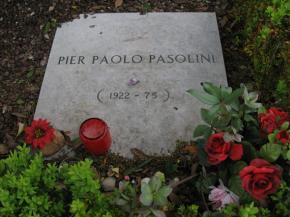by Alfredo Jaar, 2009, 38'
| WRITTEN AND DIRECTED BY: Alfredo Jaar | SOUND RECORDING: Nicolas Jaar | |
| PHOTOGRAPHY: Alfredo Jaar | TRANSLATION: Luigi Fassi | |
| EDITING: Alfredo Jaar, Mauricio Arango | PRODUCTION: Angola 72 Films | |
| SOUND: Mauricio Arango | PRODUCTION ASSISTANT: Francesca Bertolotti |
 Presented at The Screen of the Arts 2009
Presented at The Screen of the Arts 2009The Ashes of Pasolini was created for The Fear Society - Pabellón de la Urgencia, an exhibition produced by Murcia Autonomous Region as a collateral event of the 2009 Venice Biennale, in preparation for Manifesta 8 to take place in Murcia in 2010. This video work is centred on the theme of awareness. Art cannot avoid being involved with politics and ethics.
This theme is always at the core of Jaar’s work, who grew up during Pinochet’s military dictatorship. His works are openly critical of the regime and illustrate cases of political oppression and social emargination.
Jaar tells the story of Pasolini’s life and of his tragic death in a documentary film constructed with excerpts shot by Jaar and others shot by Pasolini. Other archival material and interviews is used in which Pasolini denounces the stereotyped homologation, induced by a consumerist society. Today his words appear extraordinarily prophetic in light of the actual social and political situation in our country. This turns Jaar’s work into a lucid, merciless analysis of Italian society, which is consumed by the power of the society of spectacle. “Art + Politics = Art”: with this icastic formula Jaar synthesises Paolini’s poetic and civil experience, which is radical an not orthodox. In an ideal connection to some historical extraordinary voices, Jaar’s homage to Pasolini follows the poem Le ceneri di Gramsci which Pasolini created in 1954 as an homage to Antonio Gramsci, the Italian intellectual who died in 1937 after ten years in the fascists jails. Gramsci already inspired another work by Jaar, the 2004-2005 Gramsci Trilogy.
With The Ashes of Pasolini Jaar confirms that he belongs to a school of thought which is critical and leftist. In one of the first sequences of this film, a photograph shows Pasolini standing, deep in thought, in front of Gramsci’s grave inside Rome’s English Cemetery. Jaar shoots the same place while Pasolini’s off screen voice recites a marvellous passage from his poems dedicated to Gramsci. Shirley Bassey sings “History Repeating” in the Propellerhead song which accompanies one of the most intense sequences of this work in which the glittering and alienating images of the dodgem cars called ‘Delightful Casarsa’ become an allegorical infernal circle for the consumerist society denounced by Pasolini. The same images become a bitter counterpoint to Pasolinis’ solitary grave which, in that very same Casarsa one Autumn day, Jaar’s hand clears from fallen leaves with a gesture full of pietas, revealing the name written on it.
Finally, in a pitiless contrapasso, it is on television that the news of Pasolini’ death breaks, on the night between November 1st and 2nd, 1975. We hear the speaker’s comment, the words of eyewitness collected by a reporter sent on the scene and Pasolini’s own words, read by an off-screen voice and taken from one of his articles for Corriere della Sera in which the writer calls for a Nuremberg-style trial against the arrogance and corruption of the dominant political class. They accompany the images of Pasolini’s tortured body laying abandoned in the dusty Ostia’s Idroscalo. This is the very same suburban district that appears in the final sequence of Mamma Roma, and Jaar chooses it to close his film. “We have lost a poet” Alberto Moravia cried at Pasolini’s funeral “and only three or four poets are born each century”.
Alfredo Jaar
Architect, artist and film maker, lives in New York. Among his recent solo shows are the ones at MACRO in Rome (2006), at the Fundaciòn Telefonica in Santiago (2006), at Musée Cantonal des Beaux-Arts de Lausanne, (2007) and at Bicocca/Spazio Oberdan in Milano (2008). In 2009 he took part in Against Exclusion, Moscow Biennale; When the Lightness of Poetry, Sculpture International Rotterdam; and in Prospects: An Exploration of Mining, San Valley Center for the Arts, Ketchum, Idaho.
www.alfredojaar.net